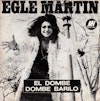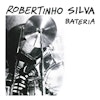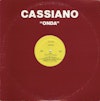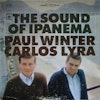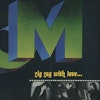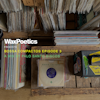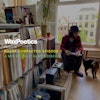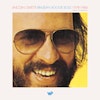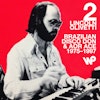Brazilian poet/lyricist, diplomat, and self-proclaimed “Blackest white man in Brazil” Vinicius de Moraes reveals much in his handwritten liner notes to this Egle Martin single from 1970. “The dombe, the child of candombe, is destined to catch fire worldwide, like the rumba, the mambo, the cha-cha-cha, and now the samba, through the bossa nova,” he wrote. Judging from Vinicius’s note, Egle’s foray into the Afro-Argentinean sound was a shot at launching a new Latin dance fad with debts to candombe but with a modern rhythm section for the kids—something like what boogaloo is to traditional Latin rhythms. Egle’s dombe was a minor hit in her native Argentina, but, unfortunately, this pop adaptation of the regional candombe style never found an audience outside of Argentina and Uruguay, where it is most widely appreciated.
Candombe, like most African traditions brought over to the New World by slaves, was marginalized, outlawed, and shunned by Argentina’s ruling class during the colonial era and, arguably, up to the present day. Today, roughly five percent of Argentines self-identify as having African heritage, despite the fact that throughout the eighteenth and nineteenth centuries up to fifty percent of the population of some provinces were of African descent. Wars, disease, and high infant mortality rates decimated the male Afro-Argentinean population during the latter half of the nineteenth century, leaving the women to intermarry with the booming European immigrant population. Today, there are only a few small pockets of Afro-Argentineans remaining in Buenos Aires.
Egle Martin started performing in 1963, starring in films and recording on various musical projects, including a soundtrack collaboration with tango master Astor Piazzolla. When asked about “El Dombe” and “Dombe Barilo,” her only foray into candombe, she said, “During the many years I looked for my own voice, I sang jazz, then my Brazilian friends introduced me to the bossa nova.” Encouraged by Brazilian musician friends Maysa and Vinicius to “find the bossa nova from Buenos Aires,” Egle’s search led her to “some Afro-Argentineans in a basement playing candombe!”
Similar to hybrid musical styles from across the Americas, like samba from Brazil and son from Cuba, candombe mixes traditional rhythms with European accents. Three drums of different sizes are employed to create the syncopated beat at the core of the candombe. Egle’s tunes build on this rhythm, but her take on the style augments the drum trio with a drum kit, electric bass, electric guitar, and a smoking horn section. Normally, candombes are sung by a single female vocal, a tradition that works in the favor of this singer/actress. Sounding like a Latin Shirley Bassey backed by Jorge Ben’s band, the girl from Buenos Aires made two very convincing arguments about why candombe should’ve been the next bossa nova.
